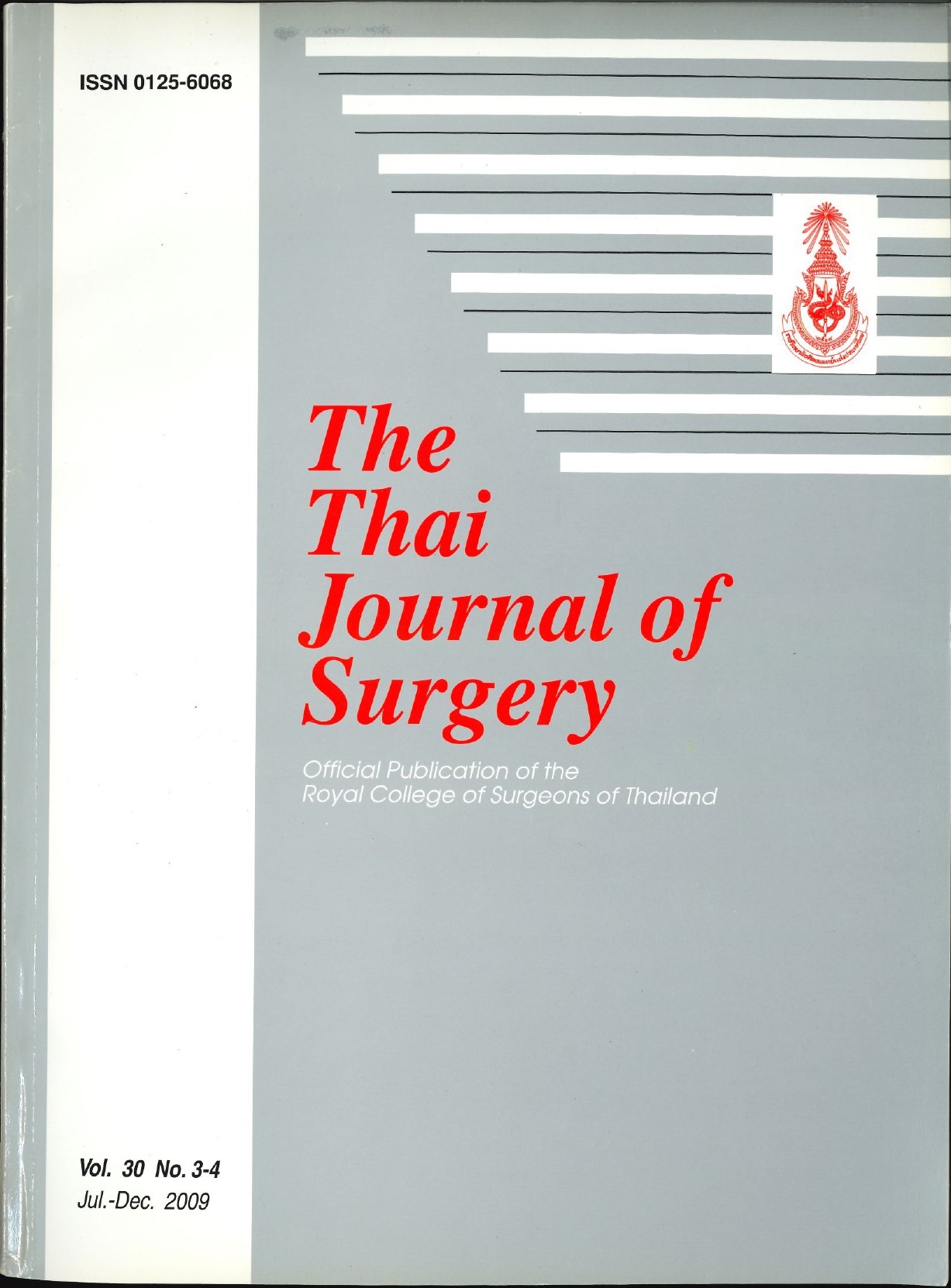Combined Hepatectomy and Radiofrequency Ablation for Multifocal Hepatocellular Carcinoma: A Novel Concept for Curative Treatment and Reported Cases at Phramongkutklao Hospital
Keywords:
Hepatocellular carcinoma, hepatectomy, radiofrequency ablationAbstract
Objective: To evaluate the criteria in patient selection, safety and short-term results of combined hepaticresection and radiofrequency ablation (RFA) for multifocal hepatocellular carcinoma.
Background: The role of combined resection and ablation has been previously reported in patients with
colorectal liver metastasis. For multifocal hepatocellular carcinomas (HCCs) that are untreatable with resection
only, locoregional therapies added to hepatectomy have been introduced. Combined resection and RFA play an
even more important role in the management of HCC because of the high frequency of multifocal tumors and
associated cirrhosis.
Materials and Methods: Case records of three patients who had six HCCs in their livers undergoing
hepatectomy combined with ultrasound-guided intra-operative RFA were reviewed. The mean diameter of the
resected tumors was 3.4 cm (range 2-5 cm) and that of ablated tumors was 2 cm (range 1-3 cm). We evaluated
the criteria in patients’ selection, safety and short-term results of combined hepatic resection and RFA.
Results: The primary effectiveness rate of RFA was 100 % in the first three months. There was no
procedure-related death occurred and there were no hepatectomy-related complications and an RFA-related
complication in all three patients.
Conclusions: Combined hepatectomy and RFA is an effective and safe treatment modality for multifocal
HCCs. However, this strategy should be performed following strict patient’s selection and within the context
of prospective clinical trials.
References
resection enhances chance for curative treatment of
hepatocellular carcinoma. Ann Surg Oncol 2007:14:3299-
300.
2. Lin SM, Lin CJ, Lin CC, et al. Radiofrequency ablation
improves prognosis compared with ethanol injection for
hepatocellular carcinoma ≤4 cm. Gastroenterology 2004;
127:1714-23.
3. Pawlik TM, Iso F, Cohen DS, et al. Combined resection and
radiofrequency ablation for advanced hepatic malignancies:
results in 172 patients. Ann Surg Oncol 2003;10:1059-
69.
4. Choi D, Lim HK, Joh JW, et al. Combined hepatectomy and
radiofrequency ablation for multifocal hepatocellular
carcinomas: long-term follow-up results and prognostic
factors. Ann Surg Oncol 2007;14:3510-18.
5. Bram F, Maarten CJ, Frederieke HD, et al, Combining partial
liver resection and local ablation of liver tumours:a preliminary
Dutch experience. World J Surg Oncol 2006;4:46.
6. Shiina S, Teratani T, Obi S, et al. A randomized controlled trial
of radiofrequency ablation with ethanol injection for small
hepatocellular carcinoma. Gastroenterology 2005;129:122-
30.
7. Raut CP, Izzo F, Marra P, et al. Significant long-term survival
after radiofrequency ablation of unresectable hepatocellular
carcinoma in patients with cirrhosis. Ann Surg Oncol
2005;12:616-28.
8. Elias D, Goharin A, El Otmany A, et al. Usefulness of intraoperative
radiofrequency thermoablation of liver tumours
associated or not with hepatectomy. Eur J Surg Oncol
2000;26:763-9.
9. Abdalla EK, Vauthey JN, Ellis LM, et al. Recurrence and
outcomes following hepatic resection, radiofrequency
ablation, and combined resection/ablation for colorectal
liver metastases. Ann Surg 2004;239:818-27.
10. Elias D, Baton O, Sideris L, Matsuhisa T, Pocard M, Lasser
P:Local recurrences after intraoperative radiofrequency
ablation of liver metastases:a comparative study with
anatomic and wedge resections. Ann Surg Oncol 2004;11:
500-5.
11. Mulier S, Mulier P, Ni Y, Miao Y, et al. Complications of
radiofrequency coagulation of liver tumours. Br J Surg 2002;
89:1206-22.
12. Livraghi T, Solbiati L, Meloni MF, et al. Treatment of focal liver
tumors with percutaneous radio-frequency ablation:
complications encountered in a multicenter study.
Radiology 2003;226:441-51.
13. Curley SA, Marra P, Beaty K, et al. Early and late complications
after radiofrequency ablation of malignant liver tumors in
608 patients. Ann Surg 2004;239:450-8.
14. Jansen MC, van Duijnhoven FH, van Hillegersberg R, et al.
Adverse effects of radiofrequency ablation of liver tumours
in the Netherlands. Br J Surg 2005;92:1248-54.
15. Solbiati L, Livraghi T, Goldberg SN, Gazelle GS. Percutaneous
radio-frequency ablation of hepatic metastases from
colorectal cancer:long term results in 117 patients. Radiology
2001;221:159-66.
16. Livraghi T, Solbiati L, Meloni F, et al. Percutaneous
radiofrequency ablation of liver metastases in potential
candidates for resection:the “test-of-time approach”.
Cancer 2003;97:3027-35.
17. Vivarelli M, Guglielmi A, Ruzzenente A, et al. Surgical resection
versus percutaneous radiofrequency ablation in the
treatment of hepatocellular carcinoma on cirrhotic liver.
Ann Surg 2004;240:102-7.
18. Liu CL, Fan ST, Lo CM, et al. Hepatic resection for bilobar
hepatocellular carcinoma:is it justified? Arch Surg 2003;
138:100-4.
Downloads
Published
How to Cite
Issue
Section
License
Articles must be contributed solely to The Thai Journal of Surgery and when published become the property of the Royal College of Surgeons of Thailand. The Royal College of Surgeons of Thailand reserves copyright on all published materials and such materials may not be reproduced in any form without the written permission.



